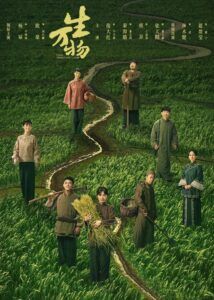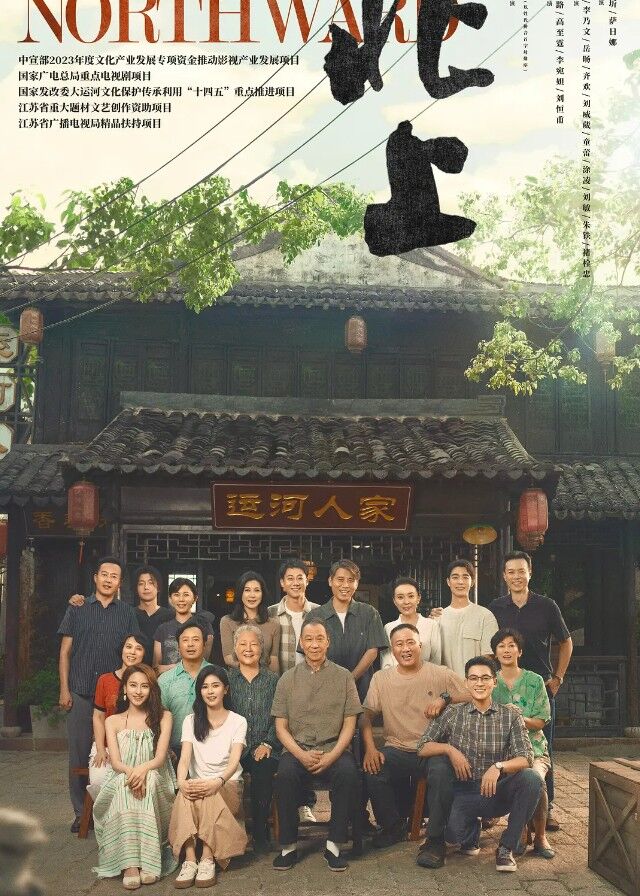Northwards Episode 1 Recap
> Northwards Recap
In 1901, an Italian man with brown hair and blue eyes traveled to China to survey the historic Grand Canal project. During his time there, he befriended a local, settled down, and started a family. Over the long years that followed, the canal nurtured generations of families living along its banks.
The ships traveling north and south carried memories spanning ancient times to the present, making the canal not merely a route for the local people, but a compass that pointed the way to the world, representing their entire lives. In the summer of 2000, ten-year-old Xia Fenghua, Xie Wanghe, Shao Xingchi, and Zhou Haikuo, all born and raised on Flower Street by the canal, were lively and mischievous children.
As usual, they coordinated their efforts to sneak into a boat cabin and steal watermelons. Even when discovered by the furious boatman, they simply laughed, leaped into the river, and swam away with their stolen bounty, eager to share their "labor" with each other. The boatman, unable to truly punish the children, reported the theft to Liang Haihong, Xie Wanghe's mother, accusing her son of stealing over a dozen watermelons and insisting her husband would have to pay.
Liang Haihong immediately apologized, promising to pay for the watermelons and asking the boatman not to be angry with the children. Meanwhile, the four culprits watched a lively ship wedding from the riverbank. Fenghua, captivated by the beautiful bride, declared that when she grew up, she wanted to have her own wedding on a ship, adding that if no one else would have her, she would marry Wanghe. Wanghe quickly retorted, joking that Fenghua's gluttony would bankrupt his family.
Soon after, Granny Ma returned with her granddaughter, Ma Siyi, a girl with striking mixed-blood features. The children enthusiastically greeted them. Fenghua, noticing Siyi's distinctive appearance, asked if she was a foreigner, to which Siyi quietly introduced herself. Unlike the boisterous children, Siyi was reserved and appeared to carry a lot on her mind. Fenghua later narrated that they didn't know then how this quiet, foreign-looking girl would change their lives.
Granny Ma later explained to some neighbors that Siyi's father had passed away, and her mother had remarried and had a son, leading her to send Siyi to live with her grandmother. This left Siyi unusually sensible and withdrawn, though she politely greeted everyone. Fenghua, ever outgoing, accompanied Siyi back to Granny Ma’s house for wontons, a frequent haunt for Fenghua. During dinner, Fenghua praised Granny Ma's wontons, recounting how she made them daily when Siyi was away.
Granny Ma mentioned that Siyi's grandfather's ancestors were foreigners. She showed them old photos, pointing out the foreign-looking people, including Siyi's grandfather and father. Siyi's father was particularly handsome with big eyes and a high nose bridge. Fenghua, excited, exclaimed that Siyi must be a foreigner, to which Siyi quietly affirmed she was Chinese, born in China, but with Italian ancestors. Granny Ma clarified that Italy was a very distant place.
Inspired, Fenghua declared that when she and Siyi grew up, she would drive a ship and take Siyi to Italy, inviting Granny Ma to join them. After dinner, Fenghua took Siyi to meet the neighbors. First, they visited the Zhou family. Fenghua introduced the family elder, Zhou Yipu, a kind and cultured man whom the children called Grandpa Zhou, and a refuge for them when they were in trouble.
She then pointed out Zhou Haikuo, her classmate, mentioning that he was good at studies and would do homework for money, a statement Haikuo quickly denied. Next, they met Zhou Haikuo's father, Zhou Yanlin, a master chef of Huaiyang cuisine who owned the "By the Canal" restaurant. Fenghua proudly added that Haikuo’s mother, Luo Zhimei, was a Kun opera singer, even prettier than Siyi.
Fenghua then took Siyi to her own home, introducing her dad, Xia Lao'er the seafarer, and her mom, Li Yan, who ran a breakfast stall. Fenghua jokingly complained about her mother's constant scolding and talkativeness, a comment that quickly made her flee from her mother's reprimand. They then met Liang Haihong, who ran the breakfast stall with Fenghua’s mom.
Finally, Fenghua introduced Xie Wanghe and his father Xie Tiancheng, whom she proudly called 'the boss of the Flower Street portion of the Grand Canal' and her father's successful seafaring partner, likening him to a Dragon King on the river. Wanghe quickly dismissed Fenghua's exaggerated claims, saying they wouldn't be renting if they were so rich. As they continued, they met Shao Xingchi.
Fenghua explained that his father, Shao Bingyi, was a writer at the cultural museum whose work had been featured in newspapers. The children's warm welcome began to help Siyi relax. Later, Fenghua, Wanghe, Xingchi, and Haikuo took Siyi to stargaze from a rooftop. Upon returning, Shao Bingyi, Shao Xingchi’s father, discreetly informed Zhou Yipu that Xie Tiancheng was planning to replace their ship.
Shao Bingyi expressed his bewilderment and dissatisfaction, noting that the current vessel was relatively new and had been purchased with everyone’s pooled money. He learned this from an antique seller whose son worked at a shipyard, where Xie Tiancheng had reportedly been negotiating for several rounds. Shao Bingyi urged Zhou Yipu to intervene, fearing Xie Tiancheng might act recklessly. Zhou Yipu reassured him, promising to speak with Xie Tiancheng when he returned.
Soon, Xie Tiancheng returned from his seafaring trip, proudly carrying gifts and distributing money to the families in the courtyard, making everyone's lives more prosperous. He announced that his recent trip with Xia Lao'er had earned them 24,000 yuan. Following the usual practice, half the money was kept for their shared account, and the other half was distributed according to each family’s shares.
With everyone gathered, he revealed his plan: capitalizing on the booming construction materials transport business and rising freight costs, he proposed selling their 500-ton ship, which he felt was too small, to buy a 1000-ton vessel. This upgrade would allow them to cover two trips of their old ship in one, saving time without significantly increasing fuel costs.
He calculated that with their current 200,000 yuan in the shared account, they would only need to raise an additional 100,000 yuan to acquire the larger ship. He confidently projected that two years of hard work with the new ship would cover the investment, with pure profit thereafter. Zhou Yipu’s son, Zhou Yanlin, however, voiced his concerns, pointing out that the Beijing-Shanghai High-Speed Railway would be fully operational by year-end, potentially impacting river transport.
Xie Tiancheng quickly dismissed these worries, arguing that while highways were fast, their costs were high, whereas river transport was free. He believed that by focusing on the Honghuai route, they would continue to thrive. He even cited the Jiangnan Shipyard’s two-year backlog of orders as proof of sustained demand. Zhou Yanlin tried to object further, but his father, Zhou Yipu, abruptly stood up and countered him.
Zhou Yipu, deeply sentimental about the Grand Canal, reminded everyone that as people born by the canal, they must never forget their roots, effectively silencing further debate. That evening, Liang Haihong expressed her misgivings to Xie Tiancheng, stressing that changing ships was a major decision requiring proper preparation and discussion. Xie Tiancheng remained convinced of the move's benefits, dismissing her concerns about potential losses, especially for Granny Ma who was raising her granddaughter alone.
He reminded her of his successful track record, claiming he had always led them to prosperity. Later, Xie Tiancheng, finding out about Wanghe’s watermelon theft, chased him with a slipper, determined to beat him, despite Wanghe’s attempts to justify himself by mentioning his father’s own childhood thefts of sweet potatoes and chives. Fenghua also faced punishment from her mother, Li Yan, for the same offense.
Shao Bingyi, already displeased with Xie Tiancheng's plan, discovered his son, Shao Xingchi, had submitted an essay riddled with errors and poor handwriting, which Xingchi admitted was written by Zhou Haikuo in exchange for ice cream. Infuriated, Shao Bingyi lashed out at his son. Despite his personal resentment towards Xie Tiancheng’s plan, Shao Bingyi refused to withdraw his shares, explaining to his wife that doing so alone would make him appear petty and betray the communal spirit.
Citing historical examples of individuals conforming to group decisions even when they believed them to be wrong, he reluctantly agreed to invest, insisting it was voluntary. Meanwhile, Li Yan and Xia Lao'er debated the new ship.
When Li Yan questioned if there was enough work for a bigger ship and Xia Lao'er replied that he merely followed Xie Tiancheng's lead, Li Yan angrily accused him of lacking his own opinion, reminding him that she, a "pure maiden," marrying him despite his lack of property was a blessing to his family, leading to a heated argument.
At the same time, Zhou Yanlin watched videos taken by Haikuo during the day, admitting to his wife, Luo Zhimei, that he regretted speaking negatively about the new ship in front of his father. He acknowledged his father’s profound emotional connection to the Grand Canal’s prosperity, not money. Zhou Yanlin agreed to invest, saying it wasn't a large sum and a potential loss would be worth his father’s happiness.
Luo Zhimei, however, worried about Granny Ma’s ability to contribute, recalling that her savings had been depleted by her son's medical expenses, leaving her struggling to raise Siyi. That night, Ma Siyi couldn't sleep. Lying in Granny Ma’s arms, she questioned why her Italian ancestors came to China during such turbulent times. Granny Ma then told her the family’s story, passed down by Siyi’s grandfather: Her great-great-grandfather, Ma Fude, an Italian, had arrived in China.
During the war, he fiercely protected his wife and children, killing two Japanese soldiers before being brutally attacked and killed by their wolfdogs. On his deathbed, Ma Fude expressed regret at not finding his brother, who was on a ship traveling north along the canal from Italy to find him. He instructed his son to continue the search. For generations, the family traveled south along the canal, eventually settling in Linqing, where Siyi's grandfather married Granny Ma.
They then continued further south, finally making Flower Street their home. When Siyi asked if Ma Fude's brother was ever found, Granny Ma sadly replied that too many years had passed, and the search was ultimately fruitless.
Granny Ma then reflected on human relationships, emphasizing the deep bonds and mutual support within their courtyard community, asserting that these neighbors, though not blood relatives, were closer than many distant family members, just like Siyi and her own mother who had grown apart.





















